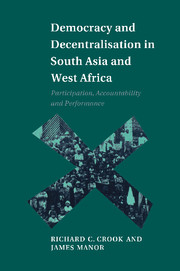5 - Ghana
Published online by Cambridge University Press: 12 October 2018
Summary
The socio-economic and political context
Ghana has experienced considerable political instability and economic decay since independence in 1957. Its deepest crisis occurred during the economic recession of the late 1970s and early 1980s, when the public services disintegrated and government lost much of its authority. One of the causes of this instability lies in the relationship between state and society which emerged during the late colonial period.
Unlike its neighbour, Côte d'Ivoire, the earlier development of cash crops, the greater density of population and colonial ‘indirect rule’ policies all combined to produce a well-developed, rich peasant/small town society, particularly in southern Ghana. The rural economy of the south became highly marketised, being dominated by smallholder production of export (mainly cocoa) and food crops.
Ghana has never known landlord, or plantation systems of agriculture on any significant scale, although recent trends have encouraged agribusiness investment in rice and palm oil. Of course there are inequalites in the smallholder sector, although by Asian standards a Ghanaian ‘rich farmer’ who employs small amounts of contract labour might be termed a ‘middle peasant'. In the cocoa industry, as in rice, there is thought to be a very small class of large-scale farmers, but the average cocoa smallholding is 2.6 hectares. Landlessness is not a major issue, most employed rural labour being traditionally migrant. The dominant elites of Ghanaian rural and small-town life are thus agro-commercial rather than landlord-based, being composed of the bigger farmers, traders and transporters together with government employees, teachers and professionals in the service sectors.
This society or rather group of societies is rooted in local communities with highly elaborated political, moral and legal institutions and identities. In the 1950s and 1960s these identities were mobilised through vigorous political competition and participation, and the overlay of party, class and associational groupings. The resulting conflicts gave a political structuring to society which has determined all subsequent conflict within the realm of the state.
The first indigenous group to take power in the 1950s, the Convention People's Party (CPP), was not an unchallenged elite; it was opposed or at least rivalled by communal and neo-traditional elites, and the forces of regionalism and localism; there was a well-established business class and farmers’ and trade union associations.
- Type
- Chapter
- Information
- Democracy and Decentralisation in South Asia and West Africa , pp. 202 - 270Publisher: Cambridge University PressPrint publication year: 1998



